California political icon Willie Brown tells it like it is in new oral history
The 10-hour oral history represents “the first real, consolidated interpretation of San Francisco at the turn of the millennium,” said Martin Meeker, director of the Oral History Center
October 8, 2020

Former San Francisco Mayor Willie Brown, shown speaking at the 2019 California Democratic Party State Convention, is the subject of an oral history just released by the Bancroft Library’s Oral History Center at UC Berkeley. (Photo by Gage Skidmore via Flickr)
Willie Brown’s legacy as a vibrant and controversial political powerhouse is woven into the history of California politics, from his 30 years in the California State Assembly — 15 as speaker — to his two terms as mayor of San Francisco. And now, Brown’s footprint — in particular, as mayor from 1996 to 2004 — is the subject of a new 10-hour oral history just released by the Oral History Center at the UC Berkeley’s Bancroft Library.
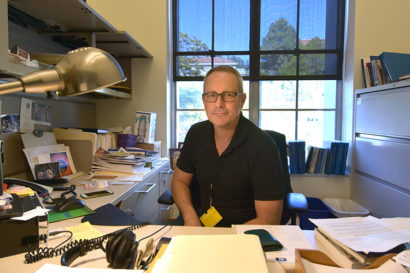
Martin Meeker, director of the Oral History Center, conducted a series of interviews with Brown in 2015, which became a 10-hour oral history that he said represents “the first real, consolidated interpretation of San Francisco at the turn of the millennium.”
The interviews represent “the first real, consolidated interpretation of San Francisco at the turn of the millennium,” said Martin Meeker, director of the Oral History Center, who interviewed Brown, 86, for the project. “It was such a critical period in the history of the city and of the state and of the nation, and here is a central figure, at the right place, at the right time, beginning to tell that history.”
Of Brown, Meeker said, “His passion for politics and exuberant style of leadership attracted the attention of leaders and influencers nationwide.”
Or, as Brown described the interviews, “It is my nature to look to the future and weigh in on what’s to come, but this has given me the opportunity to go back and really dissect the history of my time in San Francisco. If you’ve ever thought to yourself, ‘What the hell was Willie thinking?’ well, now you have the chance to hear for yourself!”
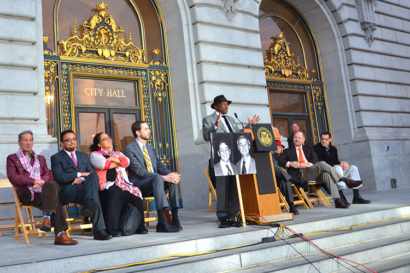
Brown speaks at a 2012 memorial for former San Francisco Mayor George Moscone and former San Francisco Supervisor Harvey Milk, who were assassinated in San Francisco City Hall in 1978. (Photo by Steve Rhodes via Flickr)
Willie Brown: Mayor of San Francisco, 1996-2004, begins with a story about how Brown, a Democrat stalwart, was reelected in 1994 as speaker of the California State Assembly, which then had a Republican majority — an event many still see as a remarkable feat. But not everyone knows what happened behind the scenes, maneuvers that Brown talks about in the interviews.
“The story involves international travel, secretive transportation of legislators to vote at the last minute, you name it,” said Meeker. “It’s got all the intrigue of House of Cards.”
From there, the oral history dives into many topics, such as Brown’s successful campaigns for mayor in 1995 and 1999; his appointment of several future state politicians to the city’s board of supervisors, including Gavin Newsom and Mark Leno; his first and second term mayoral agendas, which included economic development, tech company growth during the dot-com boom and the development of Mission Bay and the Transbay Terminal; his emphasis on diversifying the city’s administration; and how he navigated the emergence of San Francisco“progressives” as political antagonists who tried to push the city even further to the left.
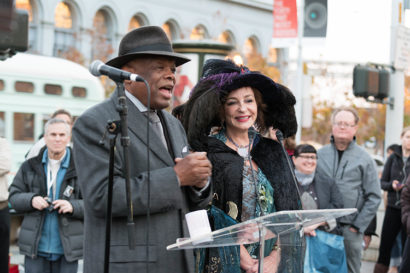
Brown was co-chair of a successful eight-year campaign, led by Donna Huggins (right), to restore the Palace of Fine Arts in San Francisco. (Photo by Dave Rauenbuehler)
“Willie Brown was a political genius who knew everyone and everything,” said Henry Brady, dean of the Goldman School of Public Policy at Berkeley. “During the last six years that he was speaker of the Assembly, Brown controlled the body, despite a slim GOP majority, and he found compromise and agreement where no one thought it possible. Still, he pushed forward an important progressive agenda that changed California politics.”
Of the new oral history, said Brady, “A chance to listen to Willie Brown is an opportunity to listen to a master politician who shaped his era through his hard work, perspicacity, progressive commitments and political genius.”
In the oral history, Brown also talks about the Berkeley campus and the importance of its innovative research. And he reflects on his own flamboyant and forceful public image — one that drew admiration and harsh criticism from politicos across California.
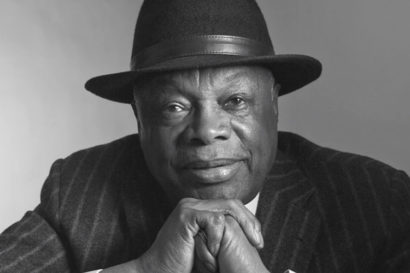
On recording his oral history, Brown said that it was an opportunity for him to go back and dissect his time in San Francisco. “If you’ve ever thought to yourself, ‘What the hell was Willie thinking?’ well, now you have the chance to hear for yourself!” (Photo courtesy of Willie Brown)
“The perception of who Willie Brown really was is what sustained me,” Brown told Meeker during the interview, “because you could not define me without there being competition for the definition, period. … People knew too much about me. They had their own attitude, and they would know whether or not the one you were trying to dump on me was applicable.”
The first African American elected as speaker of the state Assembly and as mayor of San Francisco, Brown, a resident of San Francisco, also discussed with Meeker his continuing engagement and leadership within predominantly Black neighborhoods and Black churches in the city.
“I think that’s a key part of him that doesn’t get much coverage today,” said Meeker. “But clearly, it’s still deeply important to him — participating in the communal life of Black San Francisco. It is still a key part of the person of Willie Brown.”
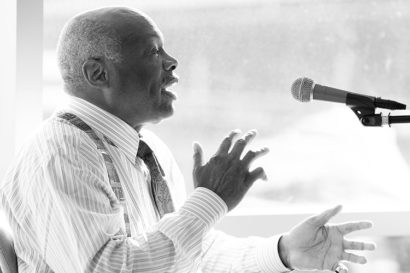
Brown speaks with comedian Will Durst on a radio talk show on KQAK-FM in 2006 for the 100th anniversary of the 1906 San Francisco earthquake. (Photo by Thomas Hawk via Flickr)
The oral history follows an earlier 14-hour interview the Oral History Center did with Brown in the early 1990s, First Among Equals: California Legislator Leadership 1964-1992, in which Brown discusses his upbringing in a segregated town in rural East Texas, why he came to California and how he fought for civil rights as an attorney before he got into politics.
Meeker said the collection will be useful to historians, high school students, journalists, bloggers and “anyone interested in learning more about the history of San Francisco and Black achievement in politics in the second half of the 20th century.”
The public can access, without charge, complete transcripts of the set of interviews on the Oral History Center website.
The new oral history, Willie Brown: Mayor of San Francisco, 1996-2004, includes:
- Brown’s vision for San Francisco, upon his election in 1995, as a place where tech jobs could thrive and how he instituted policies that paved the way.
- How he retained the speakership of the California State Assembly in 1994, when Democrats were no longer the majority and most Republicans wanted him gone.
- What Brown says about his flamboyant public image, which drew criticism. “It’s remarkable, insightful and quite meta,” said Meeker.
- His dislike of term limits, which he said robs California of its older, wiser officials, who have the most tenacity to tackle tough issues.
- Brown’s thoughts on the increasing polarization in the U.S. today between liberals and conservatives and the disappearance of moderates or centrists.
-
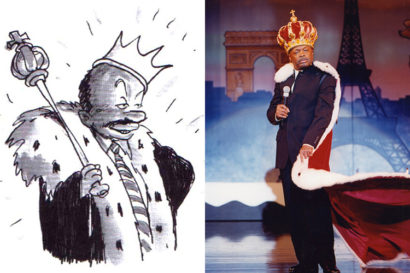
Left: “His Williness,” a character based on Brown created by San Francisco Chronicle cartoonist Phil Frank; right: Brown performs on stage as His Williness at Beach Blanket Babylon, a longtime San Francisco live musical theater event. (Left: Bancroft Library photo from the Phil Frank Archive of Comic Strips; right: Beach Blanket Babylon photo by Dave Allen)
Tales of Brown as “His Williness,” a character he played in Beach Blanket Babylon, a longtime San Francisco live musical theater event. That role was based on a character created by San Francisco Chronicle cartoonist Phil Frank, who drew Brown as a ruler in a royal robe who asked a magic mirror for advice. Of Frank’s comic strips that criticized the mayor, Brown said in the interview, “I enjoy any form of humor, whether it’s about me, against me, or with me. I really love to laugh.”
Other politicians appear in Brown’s storytelling, including former President Bill Clinton, U.S. Rep. Maxine Waters, former California Gov. Jerry Brown and former U.S. Secretary of State Hillary Clinton.
The new oral history of Brown was sponsored by the UC Office of the President, under the leadership of then-President Janet Napolitano.
Find both sets of the Willie Brown oral history transcripts and instructions on how to request audio from the interviews, as well as in-depth commentary, video excerpts, articles, notable quotes and more, on the Willie Brown Oral History webpage.